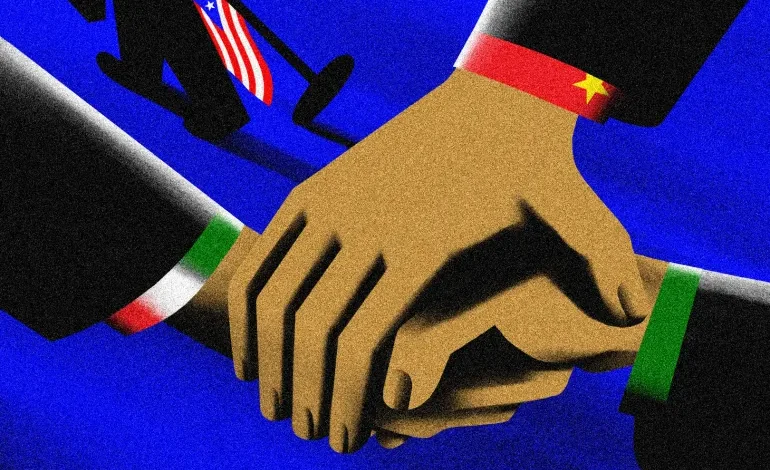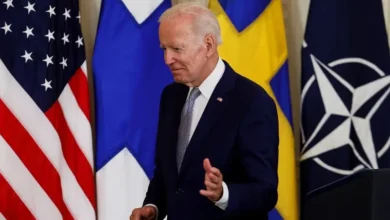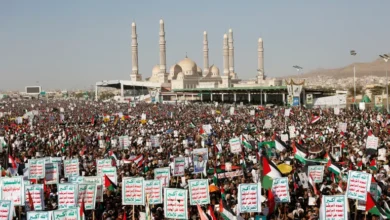Can China replace the US in the Middle East?

On April 6, the foreign ministers of Saudi Arabia and Iran met for the first time in seven years. A month earlier, top national security officials of the two countries had stunned the world, re-establishing diplomatic relations after years of hostility that had raised tensions across their shared neighbourhood.
But the meetings that led to the dramatic breakthrough were not held in the Middle East. They were hosted and mediated by China, after years of unsuccessful attempts by Oman and Iraq.In the West, China’s central role in keeping Russia’s economy afloat despite sanctions, and Beijing’s unwillingness to even question Moscow over its invasion of Ukraine have drawn sharp criticism.
Yet experts say its newfound success as a peacemaker in the Middle East signals a shift for China, which has traditionally hesitated from involving itself too deeply in efforts to resolve global conflicts.
And it seems to be dreaming big. In February, shortly before the Iran-Saudi talks concluded, Beijing launched its Global Security Initiative, with the aim of “peacefully resolving differences and disputes between countries through dialogue and consultation”.
Then last week, China’s new foreign minister, Qin Gang, said Beijing was ready to mediate peace talks between Israel and Palestine.
The Saudi-Iran deal could serve as China’s “launchpad to future initiatives”, said Julia Gurol-Haller, an associate fellow at the Arnold-Bergstraesser-Institut Freiburg in Germany. It is a declaration that China is ready to play a bigger role than it previously has in mediating conflicts, she said.
All of this comes at a time when the influence of the United States — traditionally the biggest power broker in the Middle East — has waned, according to many analysts. The US decision to pull out of the Iran nuclear deal, its blow-hot-blow-cold relationship with Saudi Arabia, and its long occupation and chaotic withdrawal from Iraq and Afghanistan have hurt its credibility. Domestic politics have also kept the US distracted, as has a growing wariness among the American public about the country’s decades-long role as a global policeman.
But can China offer the Middle East everything that the US — for all of its failings — has over the years?
The short answer: Despite its fast-rising clout, China still does not have the ability to replace the US in the Middle East, where Washington has dozens of military bases and allies it has committed to defending. But Beijing might not want to take on that responsibility yet in any case, experts say. For now, China can benefit from expanded diplomatic and economic influence while letting the US continue leading on the region’s security concerns.
Advantage China
Well before the Saudi Arabia-Iran deal, China had already established itself as a vital partner to countries in the Middle East.China is the top trading partner of Saudi Arabia and Iran and is the biggest buyer of oil from the two nations. In recent years, it has further cemented these relationships, signing a 25-year cooperation deal with Iran in 2021 and a comprehensive strategic partnership agreement with Saudi Arabia in 2022.
But that goodwill extends beyond Saudi Arabia and Iran, thanks in no small part to the massive Belt and Road Initiative (BRI) launched in 2013, with the aim of connecting Asia, Europe and Africa through a China-backed network of ports, railways, highways and other infrastructure projects.
China invested more than $273bn in the region between 2005 and 2022. It is the largest investor in the Middle East. It also buys oil from Iraq, gas from Qatar, and exports weapons to Algeria, Morocco, Turkey, Egypt and Saudi Arabia. It is helping Egypt build its new capital outside Cairo, and has constructed the metro rail network in Mecca.
In December 2022, Chinese President Xi Jinping visited Saudi Arabia for three days, during which he also held Beijing’s first-ever summits with the Arab League and the Gulf Cooperation Council (GCC). Saudi Crown Prince Mohammed bin Salman described the visit as marking “a new historical era” in ties between China and his country.
Meanwhile, China’s rapid advances in cutting-edge tech in recent years mean that Beijing can offer access to services like 5G connectivity through companies like Huawei.
All of this gives China automatic clout in the region, said Trita Parsi, the co-founder and executive vice president of the Quincy Institute for Responsible Statecraft, a Washington-based think tank. This influence has enabled Beijing to succeed with Saudi Arabia and Iran where past negotiators had failed, he said. Countries across the region want to stay in China’s good graces for economic reasons.
Even better, Beijing is viewed as an ideologically neutral trading partner, which has long maintained a policy of non-interference in the domestic issues of Middle Eastern countries, from politics to human rights, making it a less controversial mediator than countries like the US.
It is also not associated with a particular cause like the US’s close relationship with Israel, and has no history of punitive action — whether through military action or sanctions — in the region.
“At the end of the day, a key reason as to why many of these countries have a benign view of China is not just because China doesn’t interfere in their affairs, it’s because they have not seen China conduct itself in a way that would be threatening to them, or that has the potential of being threatening,” Parsi told Al Jazeera.
The US does not enjoy that reputation, even among some of its traditional partners — and the sanctions against Russia over the war in Ukraine have added to the unease in the region’s capitals, he suggested.
“With the United States, they see [it] has the ability to cut Russia off of the international financial system within five days. That is an immensely powerful tool, and the United States has not conducted itself particularly responsibly for the last 20 years,” Parsi said. “So it’s a very powerful tool in the hands of an at-times reckless player. That’s threatening.”










